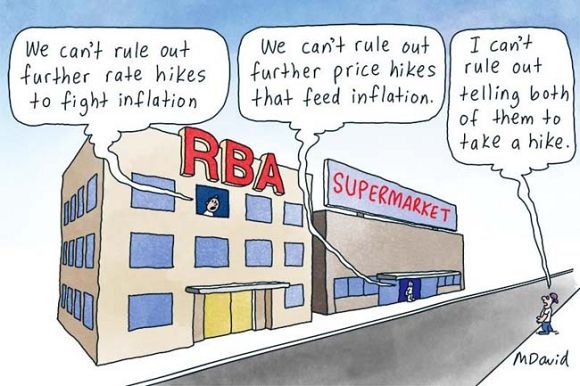Following a successful appeal to the Fair Work Commission (FWC), Labor will enforce a minimum wage increase, which will likely see Australia return to positive real wage growth, Stephen Koukoulas reports.
ONE OF THE fundamental issues that inflict financial stress and outright pain on much of the population is when wage growth is depressed.
This is especially the case when inflation rises by more than wages, meaning that the purchasing power of workers is reduced. This means that workers can buy fewer goods and services with their weekly or fortnightly pay packet as prices rise more than your take-home pay.
This can be the case even in a low-inflation environment if wage growth is lower than inflation. But it is all the more problematic when inflation is high and adding appreciably to cost-of-living pressures, eroding living standards.
In the five years before the COVID-19 pandemic, wage growth was weak and was generally slowing. While inflation was low, which at face value should be good for cost-conscious householders, the tepid and, frankly, pitiful rise in wages during this time saw living standards fall.
This extended period of flat and falling real wages was exacerbated in the great inflation surge of 2021 and 2022 when the post-COVID-19 lockdown effects of ultra-easy economic policy, accumulated savings and an array of supply chain problems unleashed inflation to a 32-year high of 7.8%.
While wage growth did increase with the election of the Labor Government in May 2022, the unexpected surge in inflation dominated household finances through to the end of that year.
Since the end of 2022, the good news is that the overdue and welcome rise in wages is being sustained at the very time inflation is falling back to the target range.
Labor successfully advocated – before the Fair Work Commission (FWC) – for wage increases of 5.2% from 1 July 2022, with a further 5.75% increase from 1 July 2023.
These pay increases – which should be viewed from "a year ahead" perspective – have coincided with inflation at 6% in the year to June 2023 and a near certain 3.5% for June 2024 — June quarter 2024 data are due for release on 31 July.
In other words, over those two years, the increase in the minimum wage has amounted to 11.1% at a time when inflation has increased by 9.7%.
This welcome cost of living news gets even better for wage earners in the year ahead.
In a recently announced decision, the FWC has delivered a further 3.75% increase in the minimum wage from 1 July 2024.
This increase is in the context of the Treasury’s Budget forecast for inflation to ease to 2.75% in the year to June 2025, thereby ensuring a further rise in real wages.
If this forecast is broadly correct, it means that by the middle of 2025, the minimum wage will have increased by 15.4% with inflation over that time around 12.7% — a total increase of 2.7% in real wages and the start of the long march to get real wages rising again.
There is also good news that these sorts of wage increases are being delivered at a time when the unemployment rate has been in a broad 3.5 to 4.5% range, which is considered to be a rate consistent with full employment.
The recent trends in growth in wages, inflation and unemployment make a mockery of what is clearly outdated economic thinking, which had as a default position rising wages and low unemployment automatically feed into inflation and that as a result, the economy must be crushed under the weight of high interest rates to get unemployment higher and wages growth lower.
This brings us to an outlook for the economy that is looking increasingly good.
The economy is not there yet but in early 2025, during the heat of the election campaign, the economic scorecard is set to confirm solid wage growth around 3.5 to 4%, inflation back to 2.5 to 2.75%, an unemployment rate below 5% and possibly as low as 4.5% and the economy returning to decent growth.
It is a platform that will likely be well received by the electorate, especially with a strong sales job from Labor’s economic ministers.
And the very refreshing thing is that it is not just a political issue, it is very good economics.
Rising wages are part of the picture of better economic times — and on that score, the trends are favourable.
Stephen Koukoulas is an IA columnist and one of Australia’s leading economic visionaries, past chief economist of Citibank and Senior economic advisor to the Prime Minister. You can follow him on Twitter/X @TheKouk.
Related Articles
- Miserable consumers are the big issue for 2024 and probably 2025
- Cost of living hardest for those on income support
- Hospitality sector crippled by cost of living crisis
 This work is licensed under a Creative Commons Attribution-NonCommercial-NoDerivs 3.0 Australia License
This work is licensed under a Creative Commons Attribution-NonCommercial-NoDerivs 3.0 Australia License
Support independent journalism Subscribe to IA.















